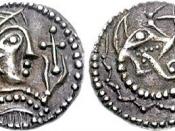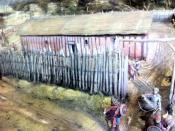R. Douglas Cole
Prof. Gregory
ENL150-01 - World Mythologies
2/19/14
Long essay 1
Christianity and Fatalism in Beowulf
The Old English Epic Beowulf is thought to be the first substantial work of Anglo-Saxon literature, and consequently one of the most important works of the time period. Written between the eighth and the eleventh century, Beowulf represents a time where Christian beliefs and pagan ideals were still relatively intermingled. Though the epic was written by a Christian author for a Christian audience, Beowulf takes place during the sixth century in the Scandinavian territories of what are now Sweden and Denmark. The epic takes place in a time in which Germanic paganism is prominent, and Christianity is still a completely foreign concept in Scandinavian territories. Consequently, there has been much debate as to whether the author's motives for blending Christian and pagan beliefs are persuasive in nature, rather than just an inevitable result of the time period. (Cavill 15) Many scholars believe that Beowulf was perhaps an attempt by the (unknown) author to correlate some well known comfortable pagan ideals with the still relatively recent Christian beliefs in order to influence any of the remaining Anglo-Saxons to abandon their heathen ways and complete the societal conversion to Christianity. However other scholars regard the extensive allusions to Christianity, and particularly the multiple mentioning of God's will as something to not put so strong an emphasis on, rather to be taken with a grain of salt. For when the author was creating the story, he inevitably would make references to what he is most familiar with. It is clear that he had an extensive knowledge of the Book of Job, and drew upon its the Bible's sources primarily to create characters that, to Christians, were easy to identify with. On the other hand however,


